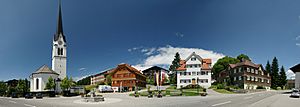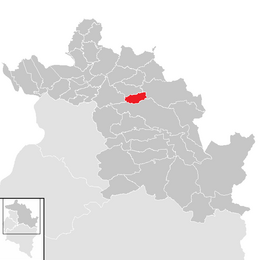Lingenau facts for kids
Quick facts for kids
Lingenau
|
||
|---|---|---|
 |
||
|
||

Location in the district
|
||
| Country | Austria | |
| State | Vorarlberg | |
| District | Bregenz | |
| Area | ||
| • Total | 6.89 km2 (2.66 sq mi) | |
| Elevation | 685 m (2,247 ft) | |
| Time zone | UTC+1 (CET) | |
| • Summer (DST) | UTC+2 (CEST) | |
| Postal code |
6951
|
|
| Area code | 05513 | |
| Vehicle registration | B | |
| Website | www.lingenau.at | |
Lingenau is a small town in the Bregenz district of Vorarlberg, a state in western Austria. It is known for its beautiful natural surroundings and rich history.
Contents
Geography of Lingenau
Lingenau is located in Austria, southeast of Lake Constance. It sits at an elevation of 685 meters (about 2,247 feet) above sea level. A large part of the area, about 30.8%, is covered by forests.
The town is part of the Naturpark Nagelfluhkette, a special nature park shared by Germany and Austria. Lingenau shares its borders with four other communities in Vorarlberg: Langenegg, Hittisau, Egg, and Alberschwende.
History of Lingenau
Early Beginnings
Lingenau was first mentioned in official papers way back in 1227. At that time, it was called "Lindigenowe." This makes it the oldest settlement in the Vorderwald region, which is also known as the Vorderer Bregenzerwald. For a long time, the land belonged to the Mehrerau monastery.
Changing Rulers
Over the centuries, different rulers controlled parts of Vorarlberg. The Habsburg family, a powerful European dynasty, ruled the area. Sometimes they ruled from Tyrol and sometimes from Vorderösterreich.
From 1805 to 1814, Lingenau was part of Bavaria, a region in Germany. After this period, it became part of Austria again. When the Austrian state of Vorarlberg was officially formed in 1861, Lingenau became a permanent part of it.
Modern Times
For many centuries, until the start of World War II, people in Lingenau benefited from a place called Bad Hohl. This was a spa located at a special spring with iron-rich water.
After World War II, from 1945 to 1955, Lingenau was in the part of Austria that was controlled by French forces.
Culture and Landmarks
Lingenau has several interesting cultural sites and landmarks that show its history and traditions.
Churches and Chapels
The main church in Lingenau is the Parish Church of St. John the Baptist (Hl. Johannes der Täufer). It was built in the 19th century. There is also the beautiful Baroque St. Anna Chapel, which was built in 1722. This chapel is special because it is made from tufa, a type of rock formed from mineral deposits.
Nature and Trails
You can explore the Tufa Nature Trail (Quelltuff-Naturlehrpfad) in Lingenau. This trail follows a creek that has created amazing rock formations made of tufa, some as tall as 40 meters (about 130 feet).
Historic Bridges
Lingenau is home to two impressive bridges over the Subersach river, connecting it to the town of Egg.
- The Gschwendtobel Bridge is a wooden bridge built in 1834. It was designed by Alois Negrelli, who was also one of the main engineers for the famous Suez Canal. This old wooden bridge is considered a masterpiece of engineering and carpentry for its time.
- The Suspension Bridge is a steel wire footbridge built in 1901. It is 57 meters (about 187 feet) long and is only for people walking.
Cheese Culture
In 2002, the Bregenzerwälder Käsekeller (Bregenz Forest Cheese Cellar) opened in Lingenau. This special cellar stores more than 32,000 wheels of cheese as they age. It was started by the Käsestraße Bregenzerwald (Cheese Road of the Bregenz Forest). Their goal is to help small farms and keep the tradition of local cheese-making alive in the Bregenz Forest. This cheese cellar was a very big investment for the dairy industry in Vorarlberg.
Walking Tours
Lingenau is part of the Bregenzerwald Umgang, which means "Bregenz Forest Walking Tour." This tour helps visitors learn about the unique architecture and community planning of 12 traditional villages in the Bregenz Forest. As you walk, you can see different landscapes, public buildings, homes, and everyday objects. This gives you a great idea of how the local architectural styles have changed over time.
Population of Lingenau
The population of Lingenau has changed over the years. Here is a look at how many people have lived in the town at different times:
| Historical population | ||
|---|---|---|
| Year | Pop. | ±% |
| 1869 | 1,022 | — |
| 1880 | 912 | −10.8% |
| 1890 | 932 | +2.2% |
| 1900 | 953 | +2.3% |
| 1910 | 1,068 | +12.1% |
| 1923 | 1,923 | +80.1% |
| 1934 | 954 | −50.4% |
| 1939 | 912 | −4.4% |
| 1951 | 1,007 | +10.4% |
| 1961 | 1,081 | +7.3% |
| 1971 | 1,171 | +8.3% |
| 1981 | 1,240 | +5.9% |
| 1991 | 1,327 | +7.0% |
| 2001 | 1,328 | +0.1% |
| 2011 | 1,337 | +0.7% |
Images for kids
See also
 In Spanish: Lingenau para niños
In Spanish: Lingenau para niños
 | James B. Knighten |
 | Azellia White |
 | Willa Brown |



